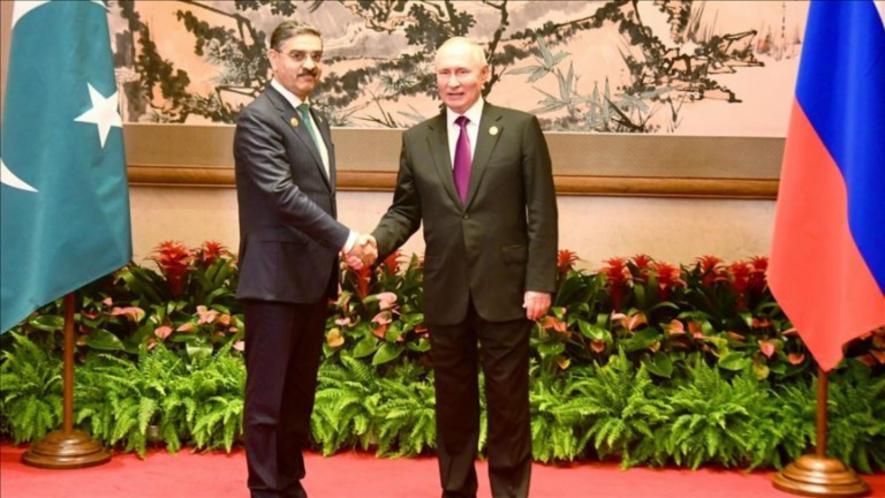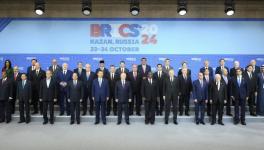India’s BRICS Quandary Deepens

Pakistan’s caretaker Prime Minister Anwaar-ul-Haq Kakar (L) met with Russian President Vladimir Putin on the sidelines of the 3rd Belt and Road Forum, Beijing, October 18, 2023.
The inevitable is finally, inexorably, happening as the government’s nine-year old strategy to isolate, demonise and brand Pakistan as a state sponsoring terrorism collapses in front of the global community. Pakistan just showed the middle finger at New Delhi by formally applying for BRICS membership.
One would presume that Islamabad’s able diplomats did the necessary legwork and tested the waters before despatching the formal application. This comes in the wake of the initiative by South African President Cyril Ramaphosa to convene a BRICS Extraordinary Joint Meeting on the West Asian Situation in Gaza on November 21, 2023 where External Affairs Minister S. Jaishankar stood in for Prime Minister Modi.
Indeed, Jaishankar’s remarks were notable for their avoidance of any censuring of Israel for its barbaric attack on Gaza as “collective punishment” for the Hamas attack of October 7, which India thoroughly condemned as an abhorrent act of terrorism. Jaishankar instead characterised Israel’s bombing of Gaza as the “ongoing Israel-Hamas conflict in Gaza”!
He altogether ignored the key issue of an immediate ceasefire. On the whole, Jaishankar’s remarks almost entirely reflected the stance of the Biden Administration. But what took the breath away was the parting kick he gave to the BRICS audience by stating that “The international community is today facing a very complex situation that has many dimensions. We have to address them all; and yet, have to prioritise.” (The BRICS Extraordinary Joint Meeting failed to adopt a joint statement, as originally promised.)
Quite possibly, Jaishankar’s jab was intended at Russia — he is terrific at shooting arrows from behind the tree — and it was duly noted in Moscow. Everything in diplomacy has a context, right?
When Pakistan’s caretaker Prime Minister Anwaarul Haq Kakar met with Russian President Vladimir Putin in Beijing on the sidelines of the Third Belt and Road Forum on October 18 to discuss a host of issues, including Middle East, terrorism, and food security, he was the third Pakistani premier to meet with the Russian president over the past year amid growing economic and diplomatic ties between the two countries.
On November 16, the Russian Deputy Foreign Minister Vershinin visited Pakistan to conduct the bilateral counter terrorism cooperation dialogue; the Russian side has invited Muhammad Kamran Akhtar, Director General in the foreign ministry for arms control and disarmament for talks in Moscow on “strategic stability”; besides, the Russian deputy foreign minister has invited the Additional Secretary (Europe) of the Ministry of Foreign Affairs which is equivalent to Deputy Foreign Minister, to visit Russia in the middle of December “to exchange views on diverse relations between Russia and Pakistan.”
Most certainly, the Pakistan-Russia bilateral consultations have noticeably intensified in the recent weeks. That follows the emergence of a virtual US-Indian quasi-alliance as a veritable geopolitical reality. Russia is moving fast in the direction of “de-hyphenating” its respective relationships with India and Pakistan.
From the Russian viewpoint, Pakistan ceased to be on its crosshairs a long time ago but out of deference to Indian sensitivity, it kept that relationship on the back burner. But this may no longer be so. From a Russian perspective, Pakistan is a more representative member of the Global South today than India, which has bandwagoned with the US across the board. And Pakistan’s “authenticity” should be, unsurprisingly, a major consideration for Russia’s current external strategies.
There is no question that Pakistan is a sincere votary of multipolarity in the international system. Pakistan no longer seeks to build on its credentials as a “major non-NATO ally” [MNNA] of the United States. Curiously, a Bill was introduced in the US Congress at the beginning of this year by Andy Biggs, a lawmaker who is a member of the Republican Hindu Caucus from Arizona. The Bill says that for Pakistan to keep the MNNA status, the US President must submit a certification to the Congress that Islamabad has met certain conditions. But Islamabad couldn’t care less.
Russia certainly takes note of Pakistan’s credentials to be an active member of the BRICS, and in all probability, Islamabad proceeded with a formal application of membership after consultations with Moscow. Pakistan enjoys the backing of China as well as some of the new members who will be inducted in January — Saudi Arabia, Iran and the UAE, in particular.
India faces a Hobson’s choice. Technically, Delhi has a free choice to reject Pakistan’s application but it is delusional to think that multiple choices exist. Blocking Pakistan’s application on account of alleged support of terrorism will only be seen as an act of petulance in such extraordinary times when India also finds itself on a hot tin roof.
Close on the heels of Canada’s allegation of Indian involvement in the killing of Khalistani separatist Nijjar comes the reported US demarche with the Indian government, levelling a similar allegation — as per a disclosure by the Financial Times, which is widely regarded as close to the Biden Administration.
In an interview with the BBC two days ago, the FT reporter repeated his claim that a team from Washington had visited Delhi to counsel India to refrain from any such criminal act. He said what remains unknown at this point in time is only as to whether the alleged operation was called off at the last minute or whether FBI successfully aborted it.
Such Western media coverage is highly damaging to India’s self-projection as a staunch follower of international law and an abiding loyalist of the “rules-based order.” In the present case, it may look as if India is throwing stones at Pakistan from a glass house.
Why is there such a groundswell of opinion in favour of Pakistan within the BRICS tent? Simply put, a perception has gained ground, which has been assiduously propagated by the western media, to the effect that Modi government is a reluctant member of the BRICS grouping.
Arguably, the more BRICS endeavours to remodel the US-dominated financial and trade architecture, the greater becomes India’s reservations about the grouping. The heart of the matter is that India is no longer enamoured of the BRICS as a vehicle challenging the US-dominated international institutions when Delhi is content with being a status quoist so long as Washington embraces it as its “indispensable partner”.
This contradiction is not easy to resolve. Logically, India no longer belongs to the BRICS. But quitting BRICS is also non-option, as India gains out of its membership — although it is hardly making any significant contribution to the advancement of the grouping. The good thing about Pakistan’s BRICS membership will be that it tilts the balance within the grouping in favour of a transformative agenda, and makes it more homogenous.
MK Bhadrakumar is a former diplomat. He was India’s ambassador to Uzbekistan and Turkey. The views are personal.
Courtesy: Indian Punchline
Get the latest reports & analysis with people's perspective on Protests, movements & deep analytical videos, discussions of the current affairs in your Telegram app. Subscribe to NewsClick's Telegram channel & get Real-Time updates on stories, as they get published on our website.
























